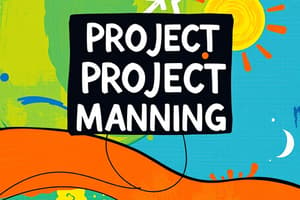Podcast
Questions and Answers
What is the primary purpose of the project initiation phase?
What is the primary purpose of the project initiation phase?
- To identify the problem or opportunity (correct)
- To formalize the project completion
- To track project progress against plans
- To allocate resources and assign responsibilities
What is the main benefit of using a project cycle?
What is the main benefit of using a project cycle?
- To reduce project timelines
- To increase project budgets
- To minimize project risks
- To ensure projects are completed on time, within budget, and to the required quality (correct)
What happens during the project planning phase?
What happens during the project planning phase?
- Defining project scope, timelines, and resources (correct)
- Tracking project progress against plans
- Carrying out project tasks and activities
- Formalizing the project completion
What is the primary focus of the project monitoring and control phase?
What is the primary focus of the project monitoring and control phase?
What happens during the project closure phase?
What happens during the project closure phase?
What is the outcome of using a project cycle?
What is the outcome of using a project cycle?
Flashcards are hidden until you start studying
Study Notes
Project Cycle Basics
What is a Project Cycle?
- A project cycle is a series of stages that a project goes through from its initiation to its closure.
- It is a logical sequence of activities that helps in planning, executing, and controlling a project.
Phases of a Project Cycle
- Project Initiation
- Identifying the problem or opportunity
- Defining project goals and objectives
- Preparing project proposal and budget
- Project Planning
- Defining project scope, timelines, and resources
- Creating project schedules and budgets
- Identifying and assessing risks
- Project Execution
- Carrying out project tasks and activities
- Allocating resources and assigning responsibilities
- Monitoring and controlling project progress
- Project Monitoring and Control
- Tracking project progress against plans
- Identifying and correcting deviations
- Taking corrective actions
- Project Closure
- Formalizing the project completion
- Evaluating project success and documenting lessons learned
- Releasing project resources
Importance of a Project Cycle
- Helps in planning and managing projects effectively
- Ensures that projects are completed on time, within budget, and to the required quality
- Facilitates monitoring and control of project progress
- Enhances project team collaboration and communication
- Provides a framework for evaluating project success and identifying areas for improvement
Project Cycle Basics
What is a Project Cycle?
- A project cycle consists of a series of stages from project initiation to closure, forming a logical sequence of activities for planning, executing, and controlling a project.
Phases of a Project Cycle
Project Initiation
- Identify problems or opportunities and define project goals and objectives.
- Prepare a project proposal and budget.
Project Planning
- Define project scope, timelines, and resources.
- Create project schedules and budgets.
- Identify and assess risks.
Project Execution
- Carry out project tasks and activities.
- Allocate resources and assign responsibilities.
- Monitor and control project progress.
Project Monitoring and Control
- Track project progress against plans.
- Identify and correct deviations.
- Take corrective actions.
Project Closure
- Formalize project completion.
- Evaluate project success and document lessons learned.
- Release project resources.
Importance of a Project Cycle
- Ensures effective planning and management of projects.
- Guarantees project completion on time, within budget, and to required quality.
- Facilitates monitoring and control of project progress.
- Enhances project team collaboration and communication.
- Provides a framework for evaluating project success and identifying areas for improvement.
Studying That Suits You
Use AI to generate personalized quizzes and flashcards to suit your learning preferences.




